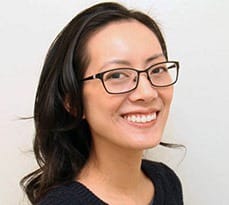

Before she had her first child six years ago, Jessica Toh, an alumna of Cambridge Judge Business School (MBA 2013), read plenty of books containing tips on infant sleep. All to little avail.
“As a new parent, I never expected that my son, would wake up every few hours for nearly two years, in spite of all the books I read and methods I tried,” she says. “It turned out there were many others in the same position, and I felt in this day and age there must be a way to solve this.”
So Jessica, who also has a one-year-old daughter, co-founded Huckleberry Labs – a startup aiming to help babies and young children to sleep better, fulfilling a long-term entrepreneurial goal to start her own business. The team has developed an app and service that combines data, science and artificial intelligence. “We offer a solution to what BabyCenter calls the number one challenge for new parents“, says Jessica. The app was launched in July this year and already attained thousands of users across 45 countries, largely through word-of-mouth.
How does it work? Parents download the free app from App Store or Google Play and log data about their child’s sleep for one week. Huckleberry Lab’s algorithms and sleep experts analyse the data and provide parents with a personalised step-by-step programme that reflects the child’s age and sleeping patterns. The team can help with various sleep issues such as night waking, insufficient sleep, resisting going to sleep, and nightmares.
Take the example of one-year-old Oliver, who was waking every hour during the night, would only fall asleep while nursing, and was getting much less sleep than recommended.
“First we modified his schedule, which reduced overtiredness. We suggested daytime activities that would help him learn the action of lying down and falling asleep, and also explained gentle steps that transitioned Oliver from nursing to sleep to falling asleep unassisted,” says Jessica. “This cut down night wakings to just a single feeding, and increased the total amount of sleep – and all without simply leaving Oliver to cry it out, which was very important to his family.”
The company currently aims its services at children aged between five months and five years old. “This is because babies’ sleep cycles change when they’re about three or four months old, and we want them to go through this period first,” Jessica explains.
Jessica said she had quite a few ideas while at Cambridge for other businesses, but decided not to pursue them after testing their business cases. “I think it’s important for an entrepreneur to be determined but at the same time know when something isn’t working. Being with a group of people in the MBA programme who were thinking about starting a business was helpful and encouraging,” she says.
Jessica says that starting a business based on her own personal experience “was a real drive for me” because she understood the situation that others were facing: “Understanding first-hand what our customers are going through, and knowing that we can directly improve their lives and wellbeing is huge.”
The California-based company was launched in 2015 and now has seven members of staff, including a chief technology officer, data scientist and paediatric sleep consultants. Jessica is Chief Executive Officer, while her partner and co-founder Seng Toh is looking after the technology side.
“This worked out perfectly for us. I know some couples can’t work together, but because we are very busy, I’m not sure we’d ever see one another if we didn’t work together!”
When asked what makes a good leader, Jessica said it involves situational and team awareness: “For a startup, a good leader needs to have a vision, be able to bring together a team that is also motivated by this vision. The leader needs to be able to take calculated risks after seeking out and listening to people, and steer the company in the right direction.”
Looking ahead, Huckleberry Labs hopes to become number one choice for parents with young children having troubles with sleeping. “I read a lot of parenting books, which sometimes contradicted each other, when I had my first child,” says Jessica, “but today more and more people expect information to be personalised and at their fingertips. And that’s where we are.”
Jessica is interested in hearing from…
…anyone working in the parenting, mobile, or digital health sectors, and parents of young children.


